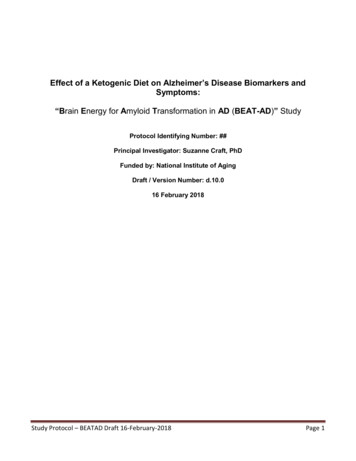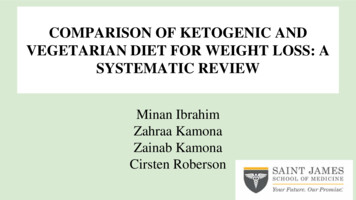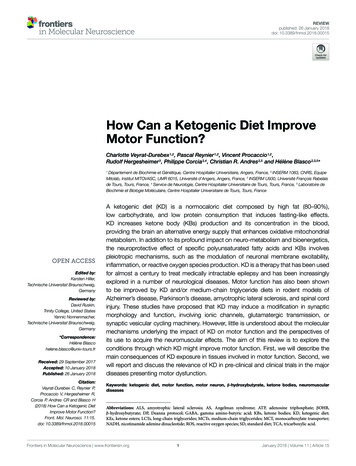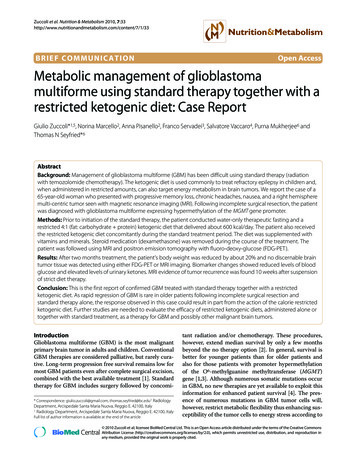
Transcription
Effect of a Ketogenic Diet on Alzheimer’s Disease Biomarkers andSymptoms:“Brain Energy for Amyloid Transformation in AD (BEAT-AD)” StudyProtocol Identifying Number: ##Principal Investigator: Suzanne Craft, PhDFunded by: National Institute of AgingDraft / Version Number: d.10.016 February 2018Study Protocol – BEATAD Draft 16-February-2018Page 1
KEY ROLESSuzanne Craft, PhD, Principal InvestigatorWake Forest School of MedicineMedical Center Boulevard, Winston-Salem, NC 27157P: 336-713-8832suzcraft@wakehealth.eduLaura Baker, PhD, Co-InvestigatorWake Forest School of MedicineMedical Center Boulevard, Winston-Salem, NC 27157P: 336-713-8831ldbaker@wakehealth.eduBenjamin Williams, MD, Study ClinicianWake Forest School of MedicineMedical Center Boulevard, Winston-Salem, NC 27157P: 336-716-4101benwilli@wakehealth.eduIris Leng, PhD, BiostatisticianWake Forest School of MedicineMedical Center Boulevard, Winston-Salem, NC 27157P: 336-716-4564ileng@wakehealth.eduTimothy Hughes, PhD, Co-InvestigatorWake Forest School of MedicineMedical Center Boulevard, Winston-Salem, NC 27157P: 336-713-3851tmhughes@wakehealth.eduYoungkyoo Jung, PhD, Co-InvestigatorWake Forest School of MedicineMedical Center Boulevard, Winston-Salem, NC 27157P: 336-716-2837yojung@wakehealth.eduAnthony Molina, PhD, Co-InvestigatorWake Forest School of MedicineMedical Center Boulevard, Winston-Salem, NC 27157P: 336-713-8584amolina@wakehealth.eduChris Whitlow, MD PhD, Co-InvestigatorWake Forest School of MedicineMedical Center Boulevard, Winston-Salem, NC 27157P: 336-716-5118cwhitlow@wakehealth.eduStudy Protocol – BEATAD Draft 16-February-2018Page 2
Tina Brinkley, PhD, Co-InvestigatorWake Forest School of MedicineMedical Center Boulevard, Winston-Salem, NC 27157P: 336-713-8534tbrinkle@wakehealth.eduJeff Williamson, MD, MHS, Co-InvestigatorWake Forest School of MedicineMedical Center Boulevard, Winston-Salem, NC 27157P: 336-713-8565jwilliam@wakehealth.eduAshley Sanderlin, PhD, Co-InvestigatorWake Forest School of MedicineMedical Center Boulevard, Winston-Salem, NC 27157P: 336-713-8817asanderl@wakehealth.eduKiran Sai, PhD, Co-InvestigatorWake Forest School of MedicineMedical Center Boulevard, Winston-Salem, NC 27157P: 336-716-5630ksolinga@wakehealth.eduSam Lockhart, PhD, Co-InvestigatorWake Forest School of MedicineMedical Center Boulevard, Winston-Salem, NC 27157P: 336-713-8145snlockha@wakehealth.eduSiobhan Hoscheidt, PhD, Co-InvestigatorWake Forest School of MedicineMedical Center Boulevard, Winston-Salem, NC 27157P: 336-716-8702shoschei@wakehealth.eduStudy Protocol – BEATAD Draft 16-February-2018Page 3
INTRODUCTION: BACKGROUND AND SCIENTIFIC RATIONALEOverviewDietary patterns have been linked to risk of developing Alzheimer’s disease (AD) – aprogressive fatal disease with no current effective treatments – that places an extraordinary burden onpatients, families and society. As recently reviewed, dietary patterns high in saturated fat and simplecarbohydrates, also termed “Western” diets, are associated with increased risk of AD and otherdementias, whereas diets high in mono- and poly-unsaturated fats, vegetables, fruits and lean proteinsare associated with reduced risk.1,2 It is not surprising that diet is a powerful modulator of brain aging.The brain derives most energetic substrates such as glucose, amino acids and fatty acids directly fromdietary sources. Diet also impacts peripheral metabolism and may thereby affect the brain. Forexample, the Western diet is associated with obesity, diabetes, inflammation, and vascular disease,disorders that increase the risk of AD through multiple mechanisms. Diets have also been used astherapeutic tools to treat medical conditions, such as the use of the ketogenic diet (KD) to treatepilepsy, and the low fat diet to treat cardiovascular disease. In preclinical studies, elevating ketones inAD mice improved memory and reduced levels of the toxic -amyloid peptide (A ), a hallmark of ADpathology.3-5. Studies that have elevated ketones with medium chain triglyceride (MCT) supplements inhumans with AD have also documented memory improvement.6,7In the following section we describe research investigating the effects of the KD on the brain, andsupport its investigation as a potential therapy for AD.The Ketogenic Diet is a Powerful Modulator of Brain FunctionThe ketogenic diet (KD) is a very low carbohydrate, adequate protein diet developed by the MayoClinic in the 1920’s to treat refractory epilepsy. Due to carbohydrate restriction, fats replace glucose asa primary energy source; the liver converts fats into fatty acids and ketone bodies ( -hydroxybutryateand acetoacetate) that are readily transported into the brain. The KD is remarkably effective; 50-70% ofpatients have 50% seizure reduction and 30% have 90% seizure reduction. 8 In recent years, severaladaptations of the KD have been developed that improve compliance and reduce health risksassociated with prolonged high intake of saturated fats. One such adaptation, the modifiedMediterranean ketogenic diet (MMKD), has comparable efficacy to the original KD but allows slightlyhigher carbohydrate consumption to permit increased intake of vegetables and fruits, and emphasizesfats and proteins derived from healthy sources such as olive oil and fish.Mechanisms underlying the effectiveness of the KD are not definitively known, but candidatesinclude reduction of neuronal hyper-excitability through glutamatergic inhibition due to increasedproduction of GABA, and KD enhancement of mitochondrial metabolism with corresponding activationof ATP-sensitive K channels. These and other potential KD-related mechanisms are discussed below.KD Effects on Neuronal Excitability. Neuronal hyper-excitability, a cardinal feature in epilepsy, hasalso been observed in amnestic mild cognitive impairment (aMCI) and early AD, particularly in brainregions prone to early amyloid deposition. Such hyper-excitability has been proposed as a cause or aneffect of amyloid deposition, and may represent a compensatory response to reduced local ATPproduction.9 Ketones modulate glutamate metabolism, increasing availability of the inhibitoryneurotransmitter GABA and may thus restore inhibitory-excitatory balance within the central nervoussystem (CNS).10 Supporting this possibility, cerebrospinal fluid (CSF) GABA levels increased followinga 4-month KD intervention in epileptic patients, and greater GABA increase was associated with betterseizure control.11Study Protocol – BEATAD Draft 16-February-2018Page 4
KD Mitochondrial Effects. Epileptogenesis is associated with disrupted mitochondrial energymetabolism and increased reactive oxygen species (ROS), pathologies also related to AD.12Mitochondria are the primary producers of ATP, through carbohydrate oxidation in the TCA cycle, andthrough -oxidation of fats. Mitochondria also play critical roles in regulation of calcium and ROS.Rodent studies have demonstrated that mitochondrial dysfunction promotes AD pathology.13-17Importantly, mitochondrial bioenergetic deficits precede amyloid plaque formation in mice, 18 andtherefore offer a potential target for early intervention. A bioenergetic shift theory of AD has evolvedsuggesting that the transition from normal aging to AD is associated with increasing reliance on fattyacid oxidation to supply brain energetic needs, in part due to mitochondrial dysfunction.19, 20In in vitro and preclinical studies, the KD has potent mitochondrial effects, modulating the expressionof enzymes involved in mitochondrial metabolism, as well as increasing mitochondrial biogenesis in keybrain regions such as the hippocampus.21 ROS are produced in the course of normal mitochondrialmetabolism, and may function as signaling effectors; they are maintained at non-pathological levels byintact antioxidant defenses. Pathological ROS levels are thought to be both a cause and effect ofimpaired mitochondrial metabolism, with glutathione (GSH) as a key ROS regulator. Ketones decreaseROS levels in in vitro and preclinical models, in part due to increased GSH biosynthesis (for a reviewsee 12). In preliminary data, we observed that adults with aMCI treated with a 6-week MMKD hadincreased mitochondrial activity in monocytes that correlated with changes in CSF A 42 and memory.Other KD-Related Mechanisms.Protein Pathways - HIF-1 , Sirt1 and MTOR: Ketogenic diets have been shown to impact otherpathways related to metabolism and autophagy. Ketogenic diets increased levels of hypoxia-induciblefactor-1 (HIF-1 ) in rodents, possibly due to succinate generation during mitochondrial metabolism ofketone bodies. Increased HIF-1 in turn increased cortical capillary density through enhancedtranscription of vascular endothelial growth factor (VEGF), with associated memory improvement.22 TheKD upregulation of proteins Sirt1 and MTOR have also been reported to suppress A production andtau hyperphosphorylation, with increased neuroprotection and autophagy.23, 24KD Epigenetic Effects: A growing body of work documents KD effects on epigeneticmechanisms. Increased neuronal hyper-excitability in rodent epilepsy models is associated with DNAhypermethylation, which is reversed by KD.25 Such effects are mediated in part through hydroxybutyrate which functions as a histone deacetylase inhibitor,26 and through adenosine-mediatednormalization of DNA methylation.27 In our proposed study, we will examine KD epigenomic effects onpathways related to oxidative phosphorylation, which in preliminary work we have shown to be relatedto aging and cognitive function.KD and CNS Insulin Resistance: Markers of brain insulin resistance have been documented inneuropathological and ex-vivo stimulation studies of human AD brain, as well as in AD animalmodels.28-30 Insulin plays an important role in memory as well as in regulation of -amyloid and tauphosphorylation (for a review, see 31). The KD has dramatic effects on peripheral insulin sensitivity, andin some rodent models also enhances brain insulin response and expression of brain insulin and IGF1receptor mRNA,32, 33 although no changes were observed in a short-term diet in C57B6 mice34. Newmethods using neural-derived plasma exosomes have been used to assess CNS insulin resistance;exosome abnormalities indicative of CNS insulin signaling defects in adults with AD have beenreported.35KD and Sphingolipid Metabolism: Recent metabolomic /lipodomic studies have identifiedabnormal brain glycerophospholipids, sphingolipids, fatty acids, and their metabolites in AD andaMCI.36, 37 Sphingolipids regulate cell membrane structure, function, and apoptosis. The coordinatedhomeostasis between cholesterol and sphingolipids protects neurons, but also likely underlies someStudy Protocol – BEATAD Draft 16-February-2018Page 5
neurodegenerative processes in AD, as they both modulate amyloid precursor protein (APP)processing.38-40 Ceramide is a key intermediate for sphingolipid metabolism.41 Elevated serum ceramideand sphingomyelin predict incident cognitive impairment, dementia and hippocampal volume loss inaging and aMCI.42-44 CSF ceramide and sphingomyelin also predicted CSF Aβ and tau levels in middleaged adults, suggesting they may also be biomarkers of early AD pathology.45 The KD has been shownto reduce levels of ceramides and other toxic lipid metabolites.46 In the proposed study, we will conducttargeted lipodomic and metabolomic analyses of sphingolipid, fatty acids and other pathways, inaddition to proteomic analyses, that may reveal novel biomarkers of early disease or treatmentresponse.KD Effects in AD.Preclinical Models and Effects on -Amyloid: Preclinical studies provide evidence of positiveeffects of elevating ketones on AD pathological processes, and in particular on regulation of -amyloid,which has been proposed as an initiator of the AD pathological cascade. Transgenic mice, 3xTgAD,treated with a ketone-inducing intervention showed less amyloid and/or tau pathology, and improvedmemory performance than chow-fed mice in three studies.3-5 These results are supported by findingsthat ketones interact with A metabolism in multiple ways. A may be transported through axons intointracellular compartments, where it interferes with mitochondrial function by binding to mitochondrialproteins, leading to increase ROS. Ketones have been shown to reduce A neurotoxicity throughblocking A entry into neurons and reducing amyloid aggregation, with associated improvements inmitochondrial function and memory.5 Furthermore, a KD has been shown to modulate gene expressionof - and -secretases, enzymes involved in Aβ clearance and degradation, and of genes involved inmitochondrial biogenesis.19, 47 Although there is growing evidence of KD-A interactions, some studiesin mice have failed to demonstrate an impact, perhaps due to genetically-based differentialsusceptibility to KD effects, as different mouse strains have been shown to have different metabolic andseizure modulating effects of the KD.48,49The preponderance of findings from preclinical studies demonstrates that ketones impact A regulation, with associated effects on mitochondrial metabolism, ROS, and memory. Clearly, furtherstudy is needed to demonstrate the relevance of these findings to humans. We have documentedchanges in CSF A 42 in adults with aMCI treated with a MMKD. In our proposed study, we will directlyaddress the question of whether MMKD modulates CSF A 42 (our primary outcome) in humans.Human AD Studies. Several studies have examined the effects of elevating ketones withmedium chain triglyceride (MCT) supplements in AD. An early study from our laboratory showed acutememory improvement after MCT consumption in adults with early AD, an effect restricted to participantswithout the APOE-e4 allele.7 In a Phase II double-blind, placebo-controlled, 3-month trial of a MCTsupplement in 152 adults with early AD, participants without the APOE-e4 allele showed significantimprovement on the Alzheimer’s Disease Assessment Scale-Cognition (ADAS-Cog). 6 This trial wascompromised however by a high rate of gastrointestinal side effects that necessitated a protocolrevision mid-trial, and resulted in a high drop-out rate in the active treatment group.Use of a supplement to increase ketone availability is an attractive strategy due to its relative easeof implementation. However, because supplements are consumed in the context of a normal diet theirefficacy may be attenuated. For example, MCT supplements do not reduce seizures in epilepsy.Pathological aspects of the typical diet such as high simple carbohydrate intake may counteract KDeffects. Additionally, many nutrient-derived substances enter the brain through competitive diffusion,and thus intake of competitive substrates may attenuate the benefit of ketone supplements. In contrast,the KD promotes endogenous elevations of ketones that are readily transported into the brain. To date,only one small trial has examined the effects of a KD in adults with aMCI.50 Twenty-three adults withaMCI were randomly assigned to a 6-week KD or AHAD. The KD diet group showed enhanced verbalmemory, as well as improved peripheral metabolism.Study Protocol – BEATAD Draft 16-February-2018Page 6
Summary: Strengths and Weaknesses of Supporting Research. The convergence of research todate indicates that the MMKD, a KD variant designed to improve compliance and nutrition, is a potenttherapy for epilepsy and may benefit aMCI via multiple pathways, through: 1) reduction of neuronalhyperexcitability; 2) improved mitochondrial function and cerebral bioenergetics; 3) reductions inoxidative stress, inflammation and lipotoxicity; 4) enhanced autophagy; and ultimately, 5) improved A and tau regulation. Preclinical studies in AD mouse models and preliminary studies that elevateketones in humans with supplements or brief diet intervention provide promising results. We will buildon this solid foundation to conduct a Phase II study that will provide rich data regarding the efficacy,feasibility, safety, and underlying mechanisms associated with MMKD intervention. These data willinform the design of a future Phase III trial and identify novel biomarkers and therapeutic targets thatmay enhance precision medicine approaches to diet and AD risk.OBJECTIVES AND PURPOSEThe purpose of this study is to examine the effects of a 4-month MMKD compared with anAmerican Heart Association Diet (AHAD - a regimen that has been shown to reduce the risk forcardiovascular disease). We will investigate diet effects on AD biomarkers, on cognition, onneuroimaging measures of metabolism, vascular function, and on CSF/blood epigenetic, exosome, andomic markers. Our study will extend previous findings in several important ways by: 1) using a MMKDrather than a traditional KD, which has the potential for greater long-term compliance and healthbenefits; 2) increasing the sample size and duration of the diet intervention; 3) examining potentialmechanisms of diet effects that may result in new biomarkers and therapeutic targets; and 4) examiningkey treatment response variables such as APOE genotype, amyloid positivity and metabolic status thatcould inform precision medicine approaches to dietary prescription.Objectives:1. Assess the safety and feasibility of a 4-month MMKD vs. the AHAD in adults with aMCI, anddetermine its effects on a key AD biomarker (CSF A 42 – primary outcome), as well as on:cognition, cerebral metabolic rate of glucose utilization (CMRg) measured with 18F-FDG PET;brain ketone utilization assessed with 11C-acetoacetate PET; MRI measures of perfusion,hippocampal volume, default mode connectivity, and white matter integrity; and other CSFbiomarkers (total tau, p-tau181).2. Investigate response moderators: APOE genotype, amyloid PET positivity and metabolic status.3. Investigate proposed mechanisms underlying MMKD effects, including: 1) neuronal activity andsynaptic function (MRI, PET); 2) bioenergetic pathways (mitochondrial function assays, plasmaneural-derived exosome markers); 3) epigenetic analyses; 4) CSF/blood multi-omic panels(proteomics, metabolomics, lipidomics, transcriptomics).Importance of the Knowledge to be GainedIn addition to knowledge gained about the potential therapeutic efficacy of a ModifiedMediterranean-Ketogenic Diet intervention in adults with early AD, the trial will also provide importantknowledge concerning the role of glucose and lipid metabolism in AD and in the effectiveness of dietinduced ketosis. Baseline metabolic status and changes in metabolic profiles may provide insight intothe differences between baseline status of the groups, but also response to the proposed intervention.This metabolic profile analysis may ultimately be used as a biomarker to determine potential efficacy ofsimilar interventions in AD. Such knowledge will be of great utility in the design of other therapeuticinterventions. Based on these potential contributions, and the minimal potential risks to safety of theparticipants, the risks of the trial are reasonable.Study Protocol – BEATAD Draft 16-February-2018Page 7
STUDY DESIGN AND ENDPOINTSAdults with aMCI (n 120) will be randomized on a 1:1 schedule to receive either a 4-monthMMKD or AHAD intervention. The MMKD and AHAD macronutrient profiles will be identical to thosetested in a pilot study (IRB# 0029992). Diet interventions will be equicaloric with participants’ normaldiets. Personalized nutritional guidance and menus will be provided, and compliance will be assessedby a registered dietitian. Amyloid PET will be conducted at baseline. Blood collection and cognitiveassessment will be conducted at baseline and after 2 and 4 months of diet. Lumbar puncture (LP), MRIand dual tracer PET will be conducted at baseline and following the intervention for all participants (seeTable 1. for a list of study measures).ParticipantsParticipants will be recruited from the Wake Forest Alzheimer’s Disease Core Center (ADCC), and fromthe community. Participants aged 55-85 years will be enrolled who meet adapted NIA-AA criteria foraMCI 51, and adjudicated by expert multidisciplinary consensus. The criteria for aMCI will be based oncognitive and clinical evaluation, and all cognitive and clinical data will be considered in assigningdiagnoses. In general, cognitive testing will indicate two deficits, 1 SD below age and educationadjusted means, on two memory tests of free and delayed recall, or on one memory and one languageor executive function test. In addition to numeric criteria, expert clinician judgment will be used tointerpret cognitive performance. The CDR score for study inclusion may be 0 or 0.5, and subjectivecognitive complaints will not be required from the participant or study partner. Given that we willconduct amyloid PET, we will be able to determine which participants meet criteria for aMCI due to AD.51We will not restrict enrollment on this basis, but rather use this criterion in responder analyses.Sample Size120 participants will be recruited for this study. Males and females will be comparably represented, andevery effort will be made to enroll an ethnically diverse sample that typifies the geographical region.Participants will be randomized to one of two diets (MMKD or AHAD) for four months, with 60participants in each diet group.Length of InterventionWe have observed effects on CSF biomarkers, cognition and imaging in our pilot study with a 6-weekMMKD intervention, and in previous month-long diet interventions. 52 We believe that a 4-month periodwill provide important feasibility and compliance data, as well as potentially reveal other cognitive andbiomarker effects useful for the design of a Phase III study.AHAD as a Control DietWe believe that the AHAD is a good comparator for the MMKD because it will require the sameattention to food intake and thus control for “meta” aspects of the intervention. As a healthy diet it isreasonable to expect it may benefit some participants, and thus will equate expectations across the twodiet intervention groups. In our pilot study the AHAD diet produced a distinct profile from the MMKD,and thus will allow us to investigate response predictors that may inform precision medicine dietaryprescriptions.Study EndpointsCSF A 42 as a Primary Endpoint: The convergence of findings from preclinical studies demonstratethat elevating ketones impacts A regulation, and we have documented changes in CSF A 42 in aMCItreated with MMKD in our pilot study. Using CSF A 42 as a primary outcome will allow us to addressthe important question of whether the MMKD modulates AD pathological processes. Given that aMCI isStudy Protocol – BEATAD Draft 16-February-2018Page 8
reliably associated with reduced CSF A 42, the expected direction of a beneficial response is for CSFlevels to increase, as we have observed. We will be able to support the interpretation that increasedCSF A 42 reflects benefit by examining associations with other outcomes. We have extensiveexperience in recruitment for studies requiring LPs; we successfully recruited 100 participants for arecent trial of a Western diet that required 2 LPs (R37AG-10880), and our pilot trial required 3 LPs. Thefact that 97% of our participants return for follow-up LPs attests to our excellent safety record and theskill of our clinicians in minimizing discomfort.Preclinical Alzheimer Cognitive Composite (PACC) as a Cognitive Endpoint: Although the PACC wasdesigned for use with preclinical AD, it is reasonable to assume it will also be sensitive in aMCI, as allPACC components are frequently used in aMCI studies. According to PACC developer, Reisa Sperling,MD, it is a useful indicator of cognitive change in aMCI in the Harvard Aging Brain Study (personalcommunication). Further, we observed significant improvement in our cognitive test composite thatincludes 2 PACC components following the MMKD.Selection of EndpointsWe have designed an ambitious study that will collect data on multiple outcomes, to inform future trialdesign and to enable the identification of novel biomarkers and therapeutic targets. The approach wehave taken is to identify a limited number of analytics from each of the proposed methods that are wellsupported by our pilot data and that will be analyzed as part of the project (Table 1. below).Table 1. All Study EndpointsPrimaryCSFAB42SecondaryCSFTotal tau, p-tau 181, ceramides, fattyacids, redox proteomic profilePETGlobal 11C-AcAc uptake, 18F-FDGALZ/PMODHippocampal volume, AD signaturecortical thickness, Default ModeNetwork connectivity, PCASLposterior cingulate perfusionMRIBloodMitochondrial basal, maximal, sparerespiratory capacity, OXPHOStranscriptomic index, OXPHOSmethylation index, exosome insulinresistance indexPACC (Primary), ADAS-COG 12, CDR,Cognition/Function Executive function tests, Cogstatetests, ADCS-ADLNPI-Q, Sleep Quality Assessment(PSQI), Epworth Sleepiness Scale,WatchPATSetting: All study visits will take place at Wake Forest Baptist Medical Center.Mood/SleepStudy Protocol – BEATAD Draft 16-February-2018Page 9
STUDY ENROLLMENT AND WITHDRAWALParticipant Inclusion Criteria:1. Male or post-menopausal female;2. Age 55 to 85 years inclusive;3. Diagnosis of amnestic mild cognitive impairment (aMCI; single or multi-domain);4. An informant (study partner) able to accompany the participant to at least 3 visits, including atleast two diet education visits;5. Stable medical condition (generally 3 months prior to screening visit) at the discretion of studyphysician;6. Stable on medications (generally 4 weeks prior to screening visit) at the discretion of studyphysician;7. Able to complete baseline assessments;8. Fasting glucose within the normal range.Participant Exclusion Criteria:1. Diagnosis of neurodegenerative illness (except for MCI);2. History of a clinically significant stroke;3. Current evidence or history in past year of focal brain lesion, head injury with loss ofconsciousness or DSM-IV criteria for any major psychiatric disorder including psychosis, majordepression, bipolar disorder, alcohol or substance abuse;4. Sensory impairment (i.e.: visual or auditory) that would preclude the participant fromparticipating in the protocol;5. Diabetes that requires current use of diabetes medications;6. Clinically significant elevations in liver function tests;7. Active neoplastic disease (stable prostate cancer and non-melanoma skin cancer ispermissible);8. History of epilepsy or seizure within past year;9. Contraindications for MRI (claustrophobia, craniofacial metal implants, pacemakers);10. Significant medical illness or organ failure, such as uncontrolled hypertension or cardiovasculardisease, chronic obstructive pulmonary disease, liver disease, or kidney disease;Study Protocol – BEATAD Draft 16-February-2018Page 10
11. Use of the following medications: anticonvulsants, drugs with potential interfering CNS effects(other than cholinesterase inhibitors or memantine), medications with significant anticholinergicactivity, anti-parkinsonian medications or regular use of narcotic analgesics; small stable dosesmay be permitted at the discretion of study clinician12. If female, menstruation in the past 12 months or hysterectomy and current hormonereplacement therapy medication;13. Major digestive disorders, absorption issues, or surgeries that may be exacerbated by dietchanges;14. Untreated hypothyroidism or B12 deficiency;15. Participants currently using resveratrol, CoQ10 (coenzyme Q10), coconut oil/other mediumchain triglyceride-containing (ie: Axona) supplements, or curcumin will be excluded unless theyare willing to discontinue them 2 weeks prior to the start of baseline visits and remain off forstudy duration.Strategies for Recruitment and RetentionA total of 120 participants (age 55-85 years) will be recruited for completion of the proposed study.Subjects that meet inclusion criteria will be randomized into one of two diet groups, the MMKD orAHAD. The AHAD group will serve as the control group and the MMKD the intervention group, eachwith a target of 60 participants.A standardized phone screen questionnaire will be used to determine basic eligibility. Potentialparticipants who pass this initial screen will then receive an in-person screening, consisting ofphysical/neurological exam, medical history, and neuropsychological exams to confirm an aMCIdiagnosis. All clinical data will be reviewed by expert study physicians and neuropsychologists. Clinicallaboratories and physical/neurological exam will be performed, or may be reviewed from a clinic visitwithin the last 6 months, in order to exclude patients with major medical disorders.Additionally, participants that gave blood in the past 56 days must agree to abstain from donating bloodfor the duration of the study. Study visits will not be scheduled until 56 days after the most recentdonation.Subject Recruitment MethodsOur lab has had ample success in recruitment for its clinical studies, thus current recruitment methodsfor other lab studies will be used. These methods include newspaper advertisements in the WinstonSalem Journal and The Chronicle, radio advertisements, postcards, website, the Memory AssessmentClinic (MAC) at Wake Forest Baptist Medical Center and community talks in churches and retirementcommunities. Males and females will be comparably represented, and every effort will be made toenroll an ethnically diverse sample that typifies the geographical region. Recruitment through talks andprint/radio ads will be targeted at the minority populations and women in order to ensure representativeenrollment in these populations.Once participants have been identified as potential study candidates, they will be contacted bytelephone by the study coordinator. The study coordinator will explain the nature of the study and thestudy procedures by reviewing the material presented on the consent form. Potential participants whoexpress interest in the study will be asked to meet with the coordinator
The Ketogenic Diet is a Powerful Modulator of Brain Function The ketogenic diet (KD) is a very low carbohydrate, adequate protein diet developed by the Mayo Clinic in the 1920’s to treat refractory epilepsy.










